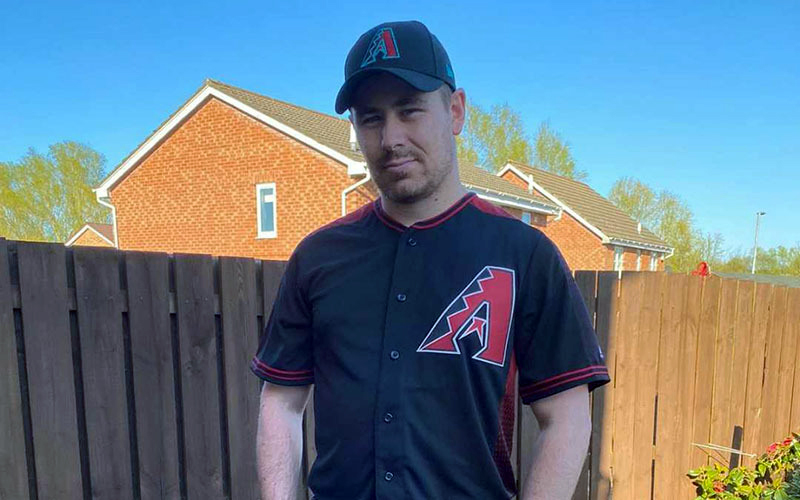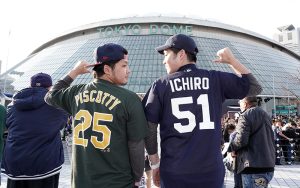
Although he was born in Scotland and still lives there, Steven Anderson is a big Arizona Diamondbacks fan, and he loves American football as well. (Photo courtesy Steven Anderson)
PHOENIX – It’s 4 a.m. on Nov. 5, 2001. An insignificant time and date for most people, but not for Steven Anderson, who’s celebrating in his living room. Awakened by the racket, his mother quickly reminds him he’s still expected to go to school that day. He doesn’t care.
The Arizona Diamondbacks are shocking the New York Yankees in Game 7 of the World Series. In the town of Motherwell, Scotland, sunrise is just a few hours away.
Anderson, now 31 and still living in Scotland, became a Diamondbacks fan in 2000, when he was introduced to baseball through a friend.
“Having to choose a team, I chose the Diamondbacks due to them having little history and I didn’t want to glory support another team. (I) felt my love for baseball could grow with the D-backs as they made their own way in the league,” Anderson said in interviews with Cronkite News via Zoom and social media.
Anderson is the type of fan the Diamondbacks are thrilled to have. Like the rest of Major League Baseball, they hope to expand their reach to the international level, and they were set to play the San Diego Padres twice in Mexico City this summer before the COVID-19 pandemic halted the season.
“The D-backs are committed to spreading our game internationally and specifically throughout Mexico, where we have thousands of loyal fans across the country,” Diamondbacks president and CEO Derrick Hall said when the games were announced in December. “As a member of MLB’s International Committee, I’ve seen firsthand the incredible efforts made on a league-wide level to help grow the sport of baseball across the globe.”
Last season, MLB played games in Japan, London and Mexico, and it talked of future games in South Korea and the Dominican Republic. This came at a time when the popularity of the game outside the United States was growing, particularly in Mexico.
From 2017-18, interest in Major League Baseball in Mexico grew from 39% to 42%, and in Japan from 22% to 24%, according to Nielsen Scarborough research.
The league also hopes it can lure more international fans by developing and scouting players from other places besides Asia and Latin America. It’s looking for players like former Diamondbacks and current Phillies shortstop Didi Gregorius and the Minnesota Twins’ Max Kepler, who were born in Holland and Germany, respectively.
Supporting the Diamondbacks was not a hard sell for Anderson, who has yet to make the trip across the pond to see the team, although it’s something he’s sure he’ll do at some point because it’s on his bucket list.
Baseball came to the United Kingdom in 2019 with the London Series featuring the New York Yankees and the Boston Red Sox, but Anderson wasn’t there.
“I refuse to give attendance to any of those two teams,” he said.
By day, Anderson is a diesel mechanic at a quarrying company, and by night, he catches as much Diamondbacks action as he can. But because of the time difference – Scotland is eight hours ahead of Phoenix – he has to take days off work to watch games live. He’ll stay up into the early hours of the morning when the game starts and sleep the next day. His weekends, though, are usually tailored around sports popular in the U.S.

When the Seattle Mariners and Oakland Athletics came to the Tokyo Dome in 2019, Japanese fans showed off their passion for Major League Baseball. (Photo by Masterpress/Getty Images)
“I love the atmosphere on the TV at the stadium,” Anderson said. “The fans always seem to back the team 100%. The players aren’t arrogant showboaters, and they don’t expect to be treated like superstars. They seem to love playing for the team, and I love that bond.
“Our guys play so hard every season, and I love the hard work. I think that’s why I feel part of the fan base from such a distance away.”
Anderson has a sports subscription that allows him to watch American sports at his home in Wishaw, a city of about 30,000 just outside Glasgow. Besides baseball, he’s been an avid Washington Redskins fan since he was about 6.
“Over here, everyone’s soccer crazy, but I would rather ‘football,’ as you guys call it,” he said. “I love it, but again I just think American sports – I think you guys do it right.”
As far as how baseball is doing in Scotland, Anderson seems to think it’s plateauing in its popularity.
“I can’t see the game getting any more popular than it is,” he said. “It just isn’t taking off.”
But he must have a group of friends to watch the games with, right?
“If I could get my friends watching baseball, it’s a win for both of us,” he said.
But it’s not for his lack of trying. Typically, Anderson breaks down all the nitty-gritty details and the level of skill involved in the game, but others’ patience runs thin and the attention gets lost because baseball is so different from soccer or rugby.
“So I’m trying to explain it to them like, ‘This is all the different things that happen within the game,’ but the more I explain the more they just go, ‘Nah, that’s too much. That’s too much for throwing a ball and hitting a bat,'” he said.
They would prefer to watch the ball leave the park on a David Ortiz home run mostly because they can’t believe a man that size plays baseball, but also because everyone is captivated by a beautiful swing, the crack of the bat and a glorious landing in the stands.
Of course, with the recent COVID-19 pandemic, no one is able to be captivated by home runs at the moment. But when that day finally arrives and sports are again available, Anderson is hopeful MLB’s regular season runs deeper into the fall than it usually does. And if that’s the case, he’s excited to experience something that sounds as if it could only happen in dreams.
“The fact that baseball season might run all into the same time as football season so I’ll constantly get football and baseball at the same time,” he said.
If sports do return to empty stadiums and ballparks, it won’t be right, Anderson says, because sports need fans, especially baseball.
“For example, you say the season goes ahead and the D-backs are playing, and they throw a no-hitter. And there’s no one there to celebrate. It just defeats the purpose. It takes that away from the game,” he said. “So I think they should just hold off, think about the guys back in Scotland, and play football and baseball at the same time.”
If only it were that easy.
Baseball has a way of unifying people, and one never really knows the magnitude of its reach. It’s easy to think of baseball as an exclusively American sport because it was born and bred here and is fondly praised as “America’s pastime.” But there are 12 professional baseball leagues worldwide besides MLB, from Latin America to Asia.
The pull of the game is strong.
“I think I was quite fortunate enough to be introduced to American sports at a young age, and I’ve just felt like I should be over in America rather than Scotland,” Anderson said.
The Diamondbacks would surely welcome him.
